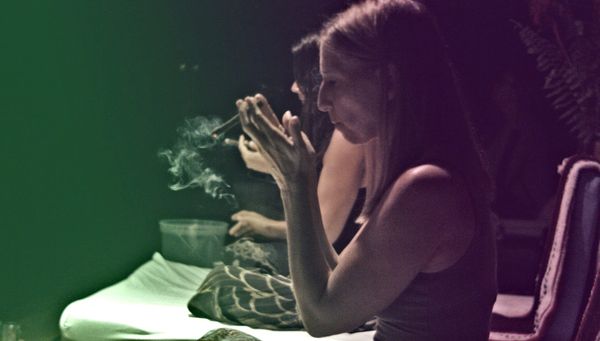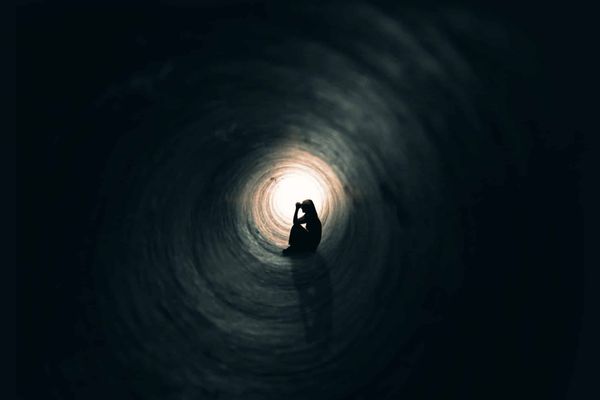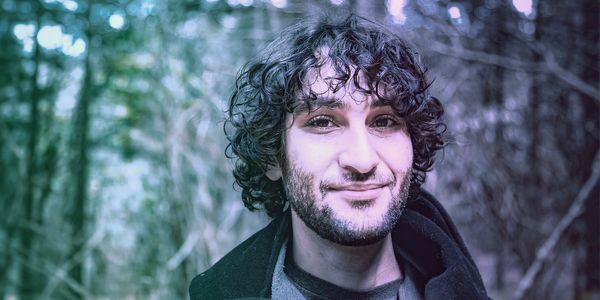Anel • • 10 min read
My Vow of Silence (And Why You Should Try a Silent Vacation)
Consciousness & Meditation Psychology & Happiness agreements

If you have ever thought about taking a vow of silence and wondered what you might need to consider, then you’ve landed on the right heli-pad. So let’s jump right in, shall we? First things first…
Why would anyone want to stop talking?
The answer is simple: to awaken awareness.
Most of us fall through our days in a kind of trance-like state. We don’t notice the details of what’s going on around us, because we’re so busy living in the past and the future that what’s happening right now simply becomes a technicality that needs to be dealt with in order to get to our next destination.
A little experiment:
When you drive from point A to point B, can you remember what you saw on the way when you get out of the car? Or were you so preoccupied that your brain just sort of edited in your surroundings, without you actually having exact cognisance of your ride?
By cultivating awareness you wake up to each moment of your life, to experience it fully and actively, and to snap out of autopilot. Awareness means you are present, you have clarity, you see broadly, you’re awake.
One of the ways in which you can cultivate your own awareness is to actively break routines in your life. The moment you break your routine in a significant way, you wake up to it. You bring yourself into the present. It becomes clear whether the action has value for you or not.
Taking a vow of silence is one way to give your life a bit of a shake and to allow awareness to flood into your life.
What Is It
There are two types of Vows of Silence:
Private
…happens in a retreat setting or in a monastery. The person is removed from their usual day-to-day environment, and the vow of silence is often coupled with long hours of meditation, dietary restrictions and other forms of purification.
The person is cut off from all communication with the outside world: all stimuli is removed, phones switched off and other devices confiscated, offering the participant the opportunity to turn their intention inwards and to really look closely at themselves, their emotions and to delve through the deluge of stuff that usually comes pouring out in this kind of process.
The person is supported by other people who share their environment, and if for whatever reason they are required to leave, someone will accompany them to speak or converse on their behalf. It may last for any length of time, anywhere from a couple of days to a lifetime commitment.
Public
…does not happen in isolation. The person does not completely retreat from society, and they are still required to interact with their environment and other people – the extent to which completely depends on their needs and desires.
The aims of such a vow are slightly different to that of a private vow of silence, because it’s not a complete “silence” in the sense of ceasing all communication. It is most commonly used as a form of protest, or to focus attention.
For the past twenty three days, I took a public vow of silence.
What I Did
I took a Vow of No Vocal Chords.
Since I wasn’t coupling my vow with anything else per se I decided to go with length rather than intensity. After some consideration I decided to do it for twenty three days, during the time that mercury goes retrograde, simply because this is considered a time of broken communication anyway and I wanted to be talking again by the twenty sixth to celebrate my friend Richard’s birthday party.
So for twenty three days I did not speak (except for the initial two clients and the odd reflex meowing at the cat). No words rolled off my tongue. No laughing. No singing. No humming. Things got fairly quiet on the mouth front. Not easy when you’re used to your own company to keep you company.
However, I emailed, sms’d, facebooked, twittered and spent time trolling around the internet, as I’m prone to doing. I communicated with people, but I steered away from talking about my process. Life happened, it just happened without me doing any speaking action.
I had my car fixed, I had a phone line installed, I bought coffees, lunches, airtime, put petrol in my car and even went to visit friends from time to time. I encountered a lot of people.
In one-on-one situations I wrote notes, made faces, gestures and dance moves to spell out the basics of what I was trying to convey. I’m an actress. It was actually quite fun.
The twenty-three days I spent not speaking was a powerful and positive experience – much stronger than I imagined it would be, especially considering that I didn’t really couple it with anything else. I hope that this post will manage to pay tribute to the beauty of it.
The Up Side
I felt a tremendous honesty in not speaking. How can you be dishonest if you don’t speak? It’s actually completely impossible. The body doesn’t lie. The face doesn’t lie.
I simply was. I was stripped of my story, of a context or a narrative, because my story is something that can only be created, sustained and defended (mostly defended) through words.
Take the words away and I’m just a human being. No big drama or intricate back story. No explanations required.
In many ways, losing the narrative was a relief.
We spend an enormous amount of energy and time creating life stories for ourselves. We create narratives and relentlessly play them out. We believe that we are defined by these stories. I came to understand quite clearly that I am not defined by that.
A while ago I watched a video by Benthino Massaro talking about suffering, and how we claim our suffering as our own. We feel we’ve earned it and we are possessive of it. This is my pain. If we can manage to let go of the story attached to it we set ourselves free. That started making an enormous amount of sense to me during ye olde vocal shut down
Humans value speech (which is a function of thought and ideas) above all else and in the process we have become disconnected from our bodies. In his TED talk (if you haven’t watched this one, it’s probably the most watched video on their site) Sir Ken Robinson mentions how his body was simply a transport system for his brain. Eve Ensler’s TED talk is also about the body disconnect, but from a much more painful perspective.
We seem to define ourselves through our ability to think and talk our way through something. We get so absorbed and entranced in thoughts and ideas that we get tied up and imprisoned by them. We get labeled. Talking can be a neat way of boxing a person in.
This sense of truthfulness extended to everything I encountered, human or not. I couldn’t label anything. I couldn’t give things a name. Instead I observed, and the more I observed the more a sense of connection to it settled in me.
I got the chance to see and feel things without interfering with them. I learnt that life can be heartbreakingly beautiful if you can just allow it to be. I learnt that I’m a bit of a control freak and that, surprisingly, everything is just fine if I allow it just to be. It’s more than just fine – it’s perfect.
One of the things a vow of silence should do is to create awareness in your daily life, and that certainly happened in my case.
I became very present in my physical body. I climbed back into my own bones and made them dance. My body movements became exaggerated. I felt myself expressed in different ways that said things about me I couldn’t say with words.
My mode of communication and awareness shifted from words to something much closer to my heart.
Because I felt more present in my body, I felt more in the moment overall.
My morning meditations were deeper, and I was able to clear my head during these times with a lot of ease. However, outside of those meditations I soon became aware of how much time I spend internally fretting about things outside of me that I cannot control, and how they go around and around without resolution, without end, just simply running around me like a hamster on a wheel.
I watched this happening, that’s all. There was not a whole lot else I could do about it, but I realised what enormous amounts of energy I waste on absolutely meaningless crap. There are a whole lot of things going on inside of me most of the time for no other reason than simply being some kind of weird soundtrack to my life. It’s quite an expensive soundtrack, is what I realised.
There was a beautiful, magical simplicity and openness to not speaking. There was a tolerance, an acceptance of things as they are and it felt respectful to the world around me. It was magical in many ways.
Talking requires a lot of energy. I realized how much time and energy I usually spend on trying to make other people feel comfortable by speaking. I can speak the biggest load of horse bollocks just so that my lips will keep moving. I don’t gain a thing from it and neither does the other person. It’s simply a “filler”, something to make us both feel comfortable with a situation which shouldn’t feel uncomfortable anyway.
I have developed a sense of deeper listening, of watching before I act, of allowing something to unfold before I respond instead of just going ahead without paying much attention. Now when I speak my words are more measured and concise.
Perhaps the most profound and moving thing that happened is this:
I regained a certain sense of personal mystery. It felt like I reclaimed a right to myself. I didn’t have to explain myself, or justify, or paint pictures. I was simply the person that you saw right now, and although I have a background, intentions and ideas, those were mine to keep. If you wanted to discover what they might be you would be required to stick around, observe closely, and essentially live with me to have the right to that kind of information. You would have to earn it, and it would take some time.
I kept thinking about this and how it plays out in my relationships. I meet someone, we fall in love. We spend the first three months talking about our lives and our past, going through it obsessively, drawing a picture of ourselves for the other person. And then one day we’re done, we’ve heard it all, and for the next ten years I reach for another glass of wine when at some party my partner tells the same old story again for the umpteenth time.
We unravel each other so quickly. We use words as a way to pinpoint things that cannot be pinpointed. A human being is a mystery, not a conversation, not something that can ever be completely expressed, and yet we hang so much value on just this one mode of understanding.
I kept fantisizing about meeting a man who’s also taken a vow of silence and having a relationship with this person in which we never speak. I think there would be a profound beauty and purity in that.
The Down Side
Practicalities — If you can’t speak, you can’t give directions to the guy from Telkom who keeps phoning and phoning your cell, even though the message clearly says that you are unable to return the call till the twenty sixth. Also, you can’t phone the landlady who’s brand new ponies are running down the street towards the R62.
Overwhelmed — The first week and the last week I felt overwhelmed by all the things that were going on inside of me that I couldn’t express. Everything became heightened and clearer and more intense. It was beautiful, but sometimes it was just plain painful.
Disempowerment — If you can’t speak you can’t defend yourself or your actions. No matter what kind of negativity is aimed at you, you’re just going to have to take it. I wonder… is that really disempowerment though? It felt like it a couple of times when I was silent, but more and more I became acutely aware of how important it is for me to learn to let go of things, not to take everything personally, to let things be.
Reactions
It was interesting how different people and personalities responded to Silent Girl. I became a white canvas that people simply projected things onto; some were supportive and kind, some believed that I was punishing myself for some sin I’d committed, some were put off, angry, resentful, dumbfounded, taken aback or even pleasantly surprised.
It became a social experiment. For a person who can speak to stop speaking in a society that is governed by thought-communication is equal to breaking a public taboo. It brought stuff up for people. They felt strongly about what I was doing, how I was going about it and what the terms and conditions of it were or should be. In short: it turned out to be quite a powerful exercise.
So how do you respond to someone who refuses to speak?
Some people felt it best also not to speak, and instead wrote me little notes, or used sign language. (This made me smile.) Some people spoke without pause, afraid of the silence that might incur if they stopped. Some people felt they could really open up and be honest with me. Some people were initially thrown by it and then grew to love it. Some people avoided me altogether.
Here’s what I noticed:
A verbal conversation is a meeting place between two people. It’s like a third person. It creates space between people. It is generated from your interior, but is then projected outward with a specific jacket and coat on, where it meets and dances with the words and sentences of the other person.
A meeting place in between two people is nice and safe. You don’t “enter” the other person (necessarily). Verbal conversations guard. It creates internal privacy.
When you take away the conversation, people feel uncomfortable. They feel uncomfortable because they are suddenly expected to relate to you from a different place. They feel exposed, which in turn makes them feel vulnerable.
When conversation gets taken away you have to connect to the other person from a different place, a more direct place, a heart place.
You can’t play things out with other people if there are no words to play them out with. Words are games. They are not straight forward. They curl up and stretch over and bend all the way back. They can blind, confuse and entrap you.
A word can be a sword, a design, an embellishment, a container, a subversion, a beautification, a veil, a diverter, a clever hat trick, a puzzle, a story. A word can do many things.
I became very aware of how I use words as a diversion. I have underestimated words. They are powerful, magical invocations, and yet I’ve used them so flippantly, so matter-of-factly that I’ve often hurt myself in the process.
Conclusion
My process ended up being very relevant to some of the things I’ve been dealing with in the past year: how I relate to other people, how I am affected by them and vice versa. I didn’t consciously plan it to look at these things, but this is what came up and it was extremely useful.
I managed to write close to 30,000 words in the last month, which is quite crazy. That was my primary goal, and I’m astonished to say that I achieved it well within the parameters of my vow.
What an amazing and boundary shifting experience!
If you have any other questions about the process, please leave a comment and I will do my best to answer you.










